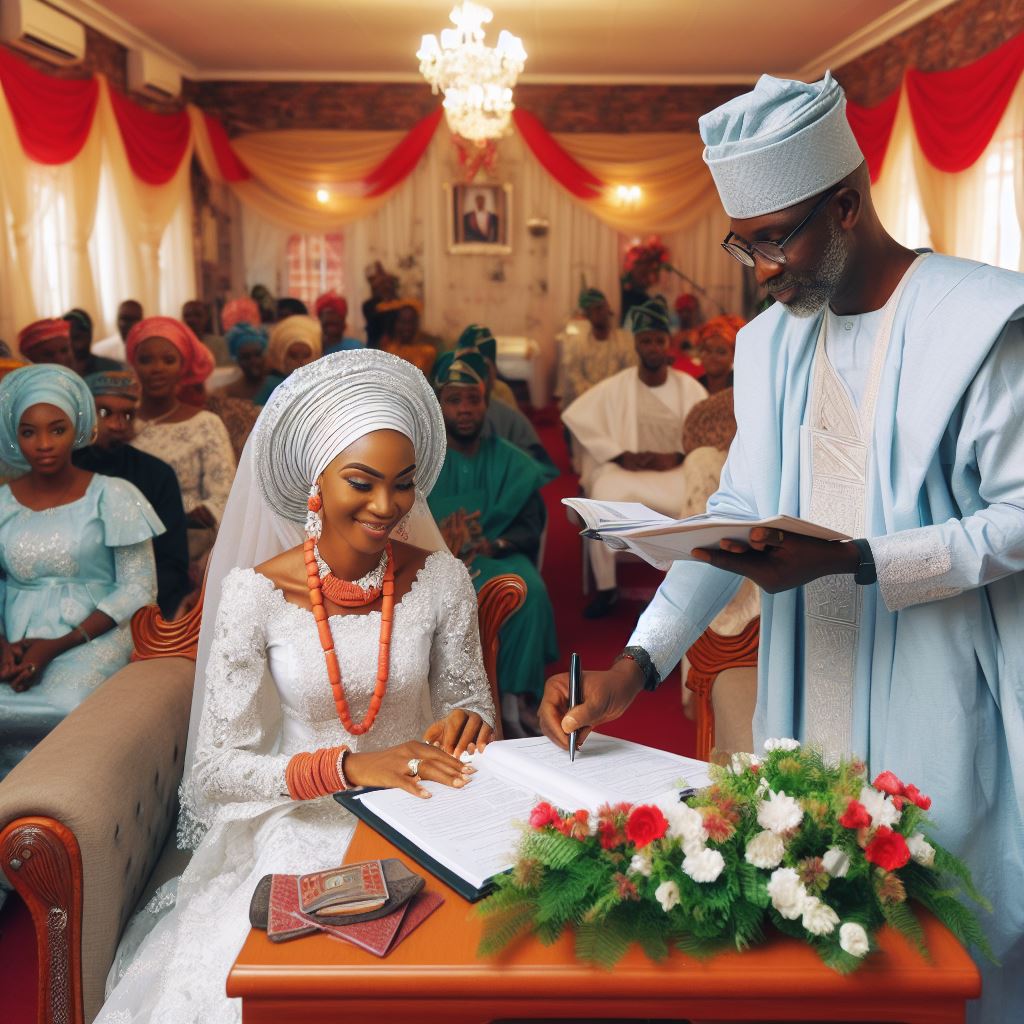Role of the Registrar in Nigerian Statutory Marriages: An Overview
Last Updated on October 18, 2023
Introduction
Definition of Nigerian Statutory Marriages
The Marriage Act in Nigeria governs Nigerian Statutory Marriages, legally recognizing them and establishing couples’ rights and obligations.
The Registrar ensures legal compliance during the ceremony.
Importance of Statutory Marriages
Statutory marriages offer legal protection of the marital union and its benefits to the couple.
These marriages provide legitimacy to children born within the union and ensure inheritance rights.
They also enable couples to access various social and economic benefits provided by the government.
Purpose of the Registrar in Nigerian Statutory Marriages
The Registrar plays a crucial role in facilitating and overseeing the registration of statutory marriages.
They ensure that all legal requirements are met, including the necessary documentation and witnesses.
The Registrar also issues the certificate of marriage, which is a legal proof of the union.
Basically, Nigerian Statutory Marriages are legally recognized unions that offer protection and benefits to couples.
The Registrar plays a vital role in ensuring the compliance and registration process of these marriages.
It is important for couples to understand and abide by the regulations to enjoy the benefits of a statutory marriage.
Overview of the Registrar’s Role in Nigerian Statutory Marriages
Appointment and Responsibilities of the Registrar
The Registrar plays a vital role in Nigerian statutory marriages.
The government appoints them, granting authority to oversee registration and ensuring legal compliance while maintaining precise records.
Registration of Marriages
To register a marriage, couples must go through a specific process.
The Registrar ensures that they complete the necessary steps and submit all required documents and forms, legally recognizing the marriage in Nigeria.
Officiating and Conducting Marriages
In addition to registration, the Registrar also has a role in officiating and conducting marriages.
They ensure that all legal requirements for solemnizing marriages are fulfilled.
With their authority, they are responsible for conducting the marriage ceremony and making it official.
Keeping and Maintenance of Marriage Records
Another important aspect of the Registrar’s role is the keeping and maintenance of marriage records.
Accurate and reliable records are crucial for legal purposes and establishing the validity of a marriage.
The Registrar ensures that all relevant information is recorded and stored securely.
Maintaining confidentiality and data protection is also an essential responsibility of the Registrar.
They handle sensitive personal information and must ensure that it is protected from unauthorized access.
This ensures the privacy and security of individuals involved in the marriage process.
Generally, the Registrar’s role in Nigerian statutory marriages is multifaceted.
They have the authority to oversee the registration process, officiate and conduct marriages, and maintain accurate and confidential marriage records.
Their work is vital in ensuring that marriages in Nigeria are legally recognized and properly documented.
Read: Marital Contracts and Agreements: Insights from Nigeria’s Marriage Act
Significance of the Registrar’s Role in Nigerian Statutory Marriages
When it comes to Nigerian statutory marriages, the role of the Registrar is of utmost importance.
This section will provide an overview of the significance of the Registrar’s role in Nigerian statutory marriages.
Safeguarding the Legal Validity of Marriages
One of the primary responsibilities of the Registrar is to ensure compliance with marriage laws.
They ensure parties’ eligibility for marriage and confirm compliance with all legal prerequisites.
In addition, the Registrar also plays a crucial role in preventing invalid or fraudulent marriages.
They investigate and perform background checks to verify genuine and legitimate marriage intentions, safeguarding individuals from unrecognized marriages.
Protecting the Rights and Interests of Parties Involved
The Registrar plays a key role in safeguarding the rights and interests of the parties involved in the marriage.
They are responsible for documenting all the necessary information and issuing marriage certificates, which serve as proof of the legal union.
Furthermore, the Registrar is responsible for maintaining marriage certificates and records.
Various legal purposes, including securing social security benefits, inheritance rights, and entitlements, necessitate the significance of these records in marriage.
Upholding Social Order and Stability
The Registrar’s role also extends to upholding social order and stability within Nigerian communities.
They have the authority to enforce marriage laws and take necessary actions against individuals who violate these laws, such as conducting sham marriages for personal gain.
Moreover, the Registrar plays a vital role in promoting cohesion and recognition of marriage within society.
They ensure that marriages are legally recognized, which contributes to the stability of families and communities.
This recognition also serves to protect the rights and privileges that come with a legally recognized marriage.
Essentially, the role of the Registrar in Nigerian statutory marriages cannot be understated.
Their responsibilities include safeguarding the legal validity of marriages, protecting the rights and interests of parties involved, and upholding social order and stability.
The Registrar plays a pivotal role in ensuring that marriages are conducted in accordance with the law, fostering the well-being of individuals and communities alike.
Read: Rights and Duties of Spouses under Nigeria’s Marriage Act
Challenges and Limitations Faced by the Registrar
The role of the registrar in Nigerian statutory marriages is not without its challenges and limitations.
In this section, we will discuss some of the key difficulties faced by registrars in performing their duties effectively.
Insufficient Resources and Infrastructure
1. Staffing and Training
One of the major challenges faced by registrars is the lack of adequate staffing and training.
As the number of marriage registrations increases, there is a need for more well-trained personnel to handle the workload effectively.
However, due to limited resources, registrars often struggle to meet the demands of the job.
2. Technological Support
Another significant hurdle is the lack of technological support.
Outdated systems and limited access to modern technology hinder the registrar’s ability to efficiently process and manage statutory marriages.
This can result in delays and errors in the registration process.
Registrars’ Integrity and Ethics
1. Preventing Corruption and Bias
Maintaining integrity and preventing corruption and bias in the registration process is crucial for registrars.
They must ensure that all marriages are registered impartially and without any undue influence.
This requires constant vigilance and adherence to ethical standards.
2. Maintaining Professionalism
Registrars are expected to maintain a high level of professionalism at all times.
They must handle each case with sensitivity, respect, and confidentiality.
They should also stay updated with changes in marriage laws and regulations to provide accurate and reliable information to couples.
Cultural and Religious Differences
1. Balancing Legal Requirements and Cultural Practices
Nigeria is a diverse country with various cultural and religious practices.
The registrar faces the challenge of striking a balance between respecting these practices and ensuring compliance with statutory marriage laws.
It requires a nuanced understanding of cultural nuances and open communication with couples.
2. Addressing Disputes and Controversial Issues
Conflicts can arise when cultural or religious practices clash with legal requirements.
The registrar plays a crucial role in addressing and resolving such disputes.
This often involves mediating between conflicting parties and finding compromises that uphold the law while respecting cultural sensitivities.
In general, the registrar’s role in Nigerian statutory marriages is essential, but it comes with its share of challenges and limitations.
Insufficient resources, technological limitations, maintaining integrity, respecting cultural differences, and resolving conflicts are all hurdles that registrars must navigate.
However, by addressing these challenges and finding innovative solutions, registrars can continue to fulfill their crucial role in facilitating and ensuring the legality of marriages in Nigeria.
Read: Annulments, Divorce, and the Marriage Act in Nigeria: Key Insights

Improvements and Reforms in the Registrar’s Role
Implementing improvements and reforms in the registrar’s role is crucial for the effective registration of statutory marriages in Nigeria.
This section uncovers opportunities to enhance the registrar’s role and improve the marriage registration process.
Strengthening Legal Frameworks and Practices
One of the primary aspects that require attention is the amendment of existing marriage laws.
Regularly update these laws to align with evolving Nigerian society needs and address gaps in the marriage registration process.
Additionally, enhancing efficiency and accessibility is essential to ensure a smooth and hassle-free registration process for couples.
To achieve this, simplify documentation requirements, enhance online registration systems, and establish user-friendly interfaces.
By making registration more accessible, the registrar’s office can accommodate a larger number of couples and reduce the possibilities of delays or administrative bottlenecks.
Collaborations and Partnerships
Engaging religious and traditional leaders is crucial for the success of the registrar’s role in Nigerian statutory marriages.
These leaders significantly shape society and directly influence those pursuing marriage.
By involving them in the registration process, the registrar can ensure cultural relevance, gain support from community members, and help eliminate any conflicts or misunderstandings that may arise due to cultural differences.
Furthermore, cooperation with relevant government agencies can lead to more efficient registration processes.
By sharing resources, expertise, and best practices, different government agencies can work together to provide a seamless registration experience.
This collaboration can also facilitate the sharing of data and information, reducing duplication of efforts and ensuring accuracy in record-keeping.
Public Awareness and Education
Promoting understanding of marriage procedures is crucial for ensuring compliance and reducing the chances of fraudulent or invalid marriages.
The registrar’s office can take proactive measures to educate the public about the necessary steps, documents required, and the legal implications of registering a marriage.
Distribute brochures, conduct workshops, or offer online resources for clear, concise information dissemination.
Additionally, informing the public about the registrar’s role is essential for building trust in the marriage registration system.
Many individuals may not be aware of the registrar’s responsibilities and may have misconceptions about the process.
By conducting awareness campaigns and highlighting the registrar’s role in safeguarding the legality and authenticity of marriages, the public can develop confidence in the system.
In essence, improvements and reforms in the registrar’s role in Nigerian statutory marriages are crucial for establishing an efficient and accessible registration process.
Strengthening legal frameworks, establishing collaborations with religious leaders and government agencies, and promoting public awareness and education are vital steps in this direction.
With these changes, the registrar’s office can better serve its purpose and contribute to the overall well-being of Nigerian couples seeking legal recognition of their unions.
Read: Marriage Registration in Nigeria: A Step-by-Step Guide
Conclusion
Recap of the Role and Importance of the Registrar in Nigerian Statutory Marriages
In Nigerian statutory marriages, the registrar plays a pivotal role in ensuring the legality of unions.
They facilitate the entire process, from documentation to solemnization, acting as a legal custodian.
Registrars guarantee that marriages adhere to the Marriage Act, safeguarding the rights and interests of the couple.
Their role in verifying eligibility and certifying unions prevents fraudulent or illegal marriages.
The Need for Continuous Support and Improvement
To maintain the integrity of statutory marriages, ongoing support and improvement for registrars are essential.
Training programs should be enhanced to keep them updated on evolving laws and best practices.
Efforts to streamline procedures can reduce bureaucratic bottlenecks, making the process more efficient.
Ensuring the well-being and job satisfaction of registrars is vital for their commitment and diligence.
Encouraging Public Engagement and Participation
Engaging the public in marriage registration processes fosters transparency and inclusivity.
Awareness campaigns should educate citizens on their rights and the importance of lawful marriages.
Feedback mechanisms should be established to allow the public to report irregularities or voice concerns.
In a nutshell, registrars are the bedrock of Nigerian statutory marriages, ensuring legality, fairness, and social order.
Continuous support and public engagement will fortify this institution, strengthening the foundations of Nigerian families and society as a whole.


